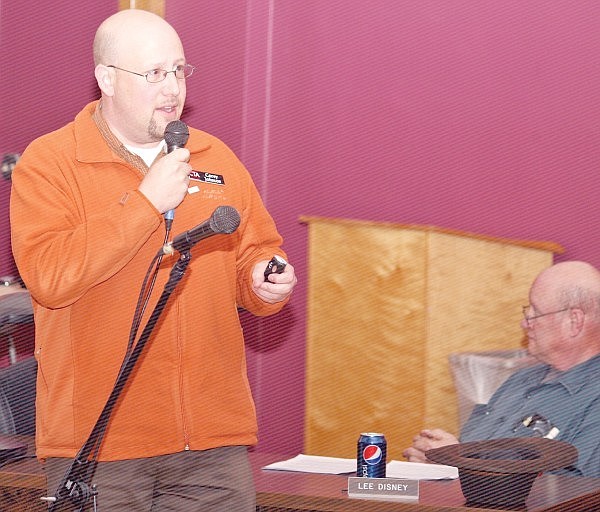School meeting draws low turnout
A sign-in sheet at the entrance to the
Little Theatre included only 18 names.
The turnout was low Tuesday night for
Libby School Board’s first informational meeting about a February
mail-ballot election that will ask the district’s voters to fund a
$12 million bond issue.
Members of the school board presented
information concerning how the money would provide needed building
upgrades and make a smooth transition from a three-campus district
to two. The board also showed how property owners could learn how
their individual property taxes would be affected if the bond
passes.
Superintendent of Schools Kirby Maki
attributes poor attendance partially to snowy and icy conditions,
and added that more meetings will be scheduled in January.
“It can be disappointing, but we just
need to have more meetings,” he said. “I think as we get closer
into January when the ballots go out people will become much more
interested.”
Excluding members of the press, school
principals and a group that has formed to promote the bond, fewer
than 10 members of the public showed up. The small school district
of Florence held a similar meeting recently that only attracted 12
people, Maki said, so the Libby district is not alone.
Board trustee Lee Disney said he wasn’t
concerned with attendance numbers.
“It’s not uncommon to get a low turnout
and you come to expect it after the years,” he said. “It’s up to us
to get out there and sell the information so that people know what
they’re voting for.”
The board this week has met with staff
at each of the three schools, for example.
“That’s 150 people – that’s not bad,”
Maki said. “We’re making progress.”
In addition, the pro-school bond group
VOTE, an acronym for Value Our Town’s Education, has set up a
website and plans to paper the town with informational flyers.
The main discussion at Tuesday’s
meeting was what voters would get for $12 million and, if the bond
doesn’t pass, what the district’s “Plan B” would be.
The Asa Wood Elementary building will
be decommissioned whether or not the bond passes, the board said.
Plan B is to spend the roughly $1 million currently in the
district’s building fund to perform the bare minimum renovations
and upgrades to get kindergarten through third-grade students in
the current middle school and seventh- and eighth-grade in the high
school.
It would be a hardship, they said, but
the district can’t afford to run three schools. Maki projects a
$450,000 shortfall next school year alone.
Libby High School Principal Rik Rewarts
sent a passionate plea to the public at the end of the board’s
presentation to pass the bond. The high school has no place for
additional students to eat lunch and no commons area for junior
high students to congregate before school starts, he said. He added
that there are only 3-1/2 open classrooms in the building.
“It would be a disservice to those kids
to move them into our building, seven through eight, without the
upgrades that are needed,” he said. “… We may have to do it, and I
understand that, but I hope the voters understand that would be a
real disservice to those kids who have to move in to either
building without doing it right.”
The consolidation will be possible
without the bond, said the district’s consultant Corey Johnson of
CTA Architects Engineers, but space would be tight at both schools
and leave little room for growth.
“With just the $1 million upgrade, by
moving K through six into this facility, we are getting into that
maximum square footage per student,” he said. “When we do the
upgrades for the $12 million scheme, it gives us some elbow room in
there, it doesn’t hit our maximum numbers and it gives us some
flexibility for the future as well.”
If the bond passes, the district would
be able to build an auxiliary gym, a separate wing for junior high
students and a separate loading and unloading area. At the current
middle school, a commons area would be built in between the school
and the detached gym and a new loading and unloading configuration
built. A district kitchen would go into one of the schools and a
warming kitchen into the other.
Board trustee Les Nelson said that if
the bond passes his property taxes would go up roughly $7 per month
or less than a quarter a day.
“Tell me what you could do for two bits
a day that would be more valuable than education,” he said.
The annual cost of the bond is
estimated at $.80 per thousand dollars of assessed value of
property. The taxes on a home with an assessed value of $100,000,
for example, would go up about $80 per year, according to numbers
provided by the school board.

